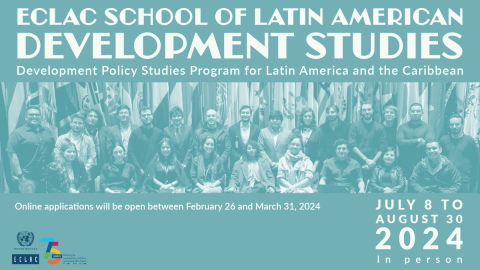Announcement
(8 July 2011) "Latin America and the Caribbean is characterized as a middle income region. The "middle-income" concept needs to be rethought as a criteria for allocating ODA resources although not all the region's countries require the same type of aid", according to the Executive Secretary of the Economic Commission for Latin America and the Caribbean (ECLAC), Alicia Bárcena, speaking today at a high-level meeting in Geneva.
On Friday, Ms. Bárcena moderated the Dialogue of Executive Secretaries of the Regional Commissions with the United Nations Economic and Social Council (ECOSOC), which was also attended by ministers and other senior representatives from ECOSOC member countries.
In her presentation, the most senior representative of ECLAC called for an increase in the official development assistance for Latin America, given that 90% of Latin Americans living in poverty are located in what are considered middle-income countries, rather than poor ones.
"The concept of "middle income" masks large disparities in the economic and social situations of the Latin American and Caribbean countries", highlighted Ms. Bárcena during the meeting entitled "Regional cooperation as a catalyst for development: examples from the regions".
The Executive Secretary also stressed the importance of regional integration and cooperation to strengthen the voice of Latin America and the Caribbean on the world stage, improve the connection between development strategies and expand South-South initiatives and subregional projects.
According to the summary by the high-ranking official: "Regional Commissions play key roles catalyzing regional and sub-regional cooperation and enhancing coherence between the regional institutional landscape and global processes".
In this framework, Ms. Bárcena stated that ECLAC supports the region's countries in various high-level political and economic forums, from the Rio Group to the Community of Latin American and Caribbean States, plus the Ibero-American Summit and subregional processes such as the Union of South American Nations (UNASUR), Southern Common Market (MERCOSUR), Central American Integration System (SICA) and the Caribbean Community (CARICOM).
The Executive Secretary referred to the current economic situation in Latin America and the Caribbean, underlining what the region has learned from past crises. She pointed out economic growth projections, fiscal prudence shown by countries and the fact that they are defining development agendas based on equality and rights.
Nevertheless, she indicated that the region faces major ongoing challenges, such as reviewing its macroeconomic policies to mitigate commodity price volatility, boost productivity and improve social inclusion.
There are gaps to be bridged in terms of equality and social protection, education, tax structure, investment and financing for development, stated Ms. Bárcena.
The aim of the Dialogue of Executive Secretaries of the Regional Commissions with ECOSOC was to examine crucial role of regional cooperation as a catalyst for development. The meeting included an exchange of good policy practices and initiatives based on regional integration and cooperation.
Any queries should be addressed to the ECLAC Public Information and Web Services Section. E-mail: dpisantiago@cepal.org; Telephone: (56 2) 210 2040.
Follow us on: Twitter, Facebook, Flickr and YouTube.



